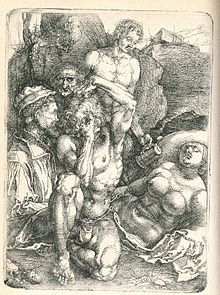Despair

Despair is a state of emotional or psychological state in a situation that is perceived as hopeless and a state of complete hopelessness. Knaur's dictionary writes that if you are desperate, you have given up hope and “ fear that something will or will not happen” and you are at a loss.
Concept history
Etymologically , despair comes from doubt and stands for 'despair, lose hope for improvement', mhd. Twīveln 'give up hope'. The Economic Encyclopedia defined Despair in 1854 as:
“A state of the human mind which consists in utter hopelessness. Despair is paired with fear and pain , both of which are extremely intensified. It brings the mind into such confusion that the desperate person either abandons himself completely helplessly to the wildest outbursts of pain, or towards a mere possibility of immediate rescue, even if the possibility of success is far away and even if there is danger, into one To come to an even more unfortunate state, without considering every means, as soon as the suspicion arises that it will bring about a quick decision. Despair often even leads to suicide , to self-destruction; because it robs the clarity of the senses, the awareness of right and wrong, and brings people to the verge of complete mental confusion or real madness . "
Art and literature
Artistic representations also have desperation as their theme, so many dramas and images.
The Greek poet Euripides gave an early elaboration in his tragedy Medea . A famous desperate scene is that of Faust in Goethe (forest and cave) . A classic supporting stage role that is driven into the utmost despair is that of Max Piccolomini in Schiller's Wallenstein .
The fate of Niobe was also a popular topic for sculptors and poets in ancient times. The cry of Edvard Munch is an example of the expressionist pictorial representation of despair.
philosophy
Here, a lack of freedom to act or make decisions, together with a negative view of the future, is seen as central to despair.
Kierkegaard defined in his work The Illness to Death Despair among other things as "illness in the self" and described it as "not-being-self".
psychology
In psychology, despair is defined as "an emotional reaction to a hopeless and hopeless lived situation of the highest personal importance". This personal assessment can be wrong, which is particularly the case with mental illnesses such as psychosis or depression . Long-lasting states of desperation are traumatic and lead to neurotic developments.
See also
Web links
Individual evidence
- ↑ Desperation in duden.de, accessed on January 28, 2013.
- ^ Knaur: The German dictionary. Lexicographical Institute, Munich 1985, p. 1040.
- ^ Etymological dictionary according to Pfeifer, online in DWDS , accessed on February 2, 2013.
- ↑ J. G. Krünitz: Oekonomische Encyklopädie , Vol. 220, 1854.
- ↑ a b Heinz Scheurer: On the psychotherapy of learned helplessness: A knowledge and treatment approach of desperation . In: Hermes Andreas Kick and Günter Dietz (eds.): Despair as a creative challenge . Lit-Verlag, Münster 2008, p. 41-57 .
- ↑ Hilge Landweer, Ursula Renz : Classical Theories of Emotion: From Plato to Wittgenstein, Walter de Gruyter 2008, p. 561, online in Google books .
- ↑ Thomas Bliesener: Der Brockhaus Psychologie: Feeling, thinking and understanding behavior . Brockhaus, 2001, ISBN 978-3-7653-0591-7 ( google.de [accessed on November 5, 2017]).
